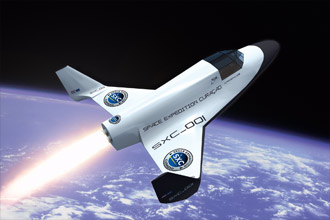Commercial space race heats up: around the world in less than two hours?

The latest entry into the commercial space travel has a very practical proposition: commercial spacecraft, launched into suborbital fight, could deliver passengers to any destination in the world within two hours.
The project, set to launch in 2014, represents the first non-touristy proposal in the commercial space race. The most likely venture to get off the ground in the near future, Virgin Galactic, is an up-and-down thrill ride.

As The Daily Mail reports:
"Michiel Mol, a Formula One tycoon and co-owner of the Force India racing team, has joined up with Dutch airline KLM to develop a spacecraft that could make weekend getaways to Australia a reality. The revolutionary vessel would make long-haul flights a thing of the past - with journeys from London to Sydney taking a mere hour and 45 minutes."
While the project will start out with suborbital flights, it may take more than a decade until regularly scheduled flights between cities become a reality. KLM Royal Dutch Airlines first announced it was joining the project at the end of last year. The launches will take place under the aegis of Space Expedition Curaçao (SXC), founded in 2008 to provide commercial space launch facilities and suborbital flight services from Curaçao. SXC intends to offer suborbital space tourism flights and scientific research missions out of Space Port Curaçao.
The spacecraft, the Lynx, is being built by XCOR Aerospace of Mojave, California. The Lynx is a piloted, two-seat, fully reusable, liquid rocket powered suborbital vehicle that takes off and lands horizontally and serves research and scientific missions and private spaceflight. The Lynx production models (designated Lynx Mark II) are designed to be robust, multi-mission commercial vehicles capable of flying more than 60 miles in altitude up to four times per day.
Thirty-five people have signed up for the inaugural flight, set to take off from the island of Curacao in 2014. The Lynx will be unveiled in the spring of 2012.
This post was originally published on Smartplanet.com